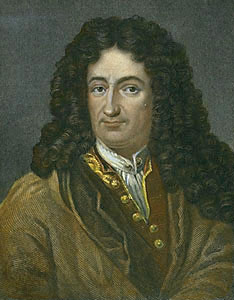Voltaire's Candide...... and Mockery
Voltaire's Candide

On the surface, Voltaire’s Candide seems to be about every stupidity, every transgression, and every immoral act conceivable to man. It is a satirical and absurd look at life and religion. It makes a mockery of organized religious institutions and leaders. The hypocrisy of the actions of these leaders makes the reader wonder if Voltaire is against every religious order and even God, or is it simply the hypocrisy he abhors. In examining this book, it is a satirical way of looking at the hypocrisy of actions while holding true that goodness outside of these institutions and inside the person is what is important and imperative. Voltaire seems to write this book as a rebuttal of the theory of Leibniz.
The two people in Candide that have a pessimistic attitude, Martin, and an optimistic attitude, Pangloss, both influence the life and actions of Candide. Pangloss is said to be a parody of Leibniz’s philosophy on good and evil. Leibniz (16-17) argued that evil only exists so that we can recognize the good. In Candide, both sides are so extreme that it keeps either Pangloss or Martin from doing anything to change their situations or that of the world. Voltaire was very critical of Leibniz and he seems to mock Leibniz’s theory of good and evil in Candide.

Mocking organized religions
The first religious leader that Candide encounters is a Protestant orator in chapter 3 who believes that the Pope is the antichrist. The orator banishes Candide for not believing that the Pope is the antichrist and his wife throws human feces over his head. The irony is not lost on the reader that the orator is trying to convert members to his beliefs while there is death and destruction all around him. The orator is the opposite of what a Christian would believe, as he is full of hate.
It is here that Candide meets the first true good person, James. James is referred to as an Anabaptist. An Anabaptist is a member of the Protestant radical movement in the 16th century that rejected infant baptism and believed in adult baptism. James seems to be one of the only people that Voltaire wrote about in a good light. James is drowned in chapter 5, trying to save a sailor from drowning. This seems to refer to baptism, again as a parody. This parody is of Pangloss and Leibniz’s theory that evil and good are always balanced. The sailor he saves is a representation of evil.
Candide meets an officer of the Inquisition in chapter 5. The Inquisitors were responsible for persecuting thousands of people by burning them at the stake for transgressions or heresy against the church. The Inquisitor pokes fun at Pangloss by saying “Apparently you don’t believe in original sin, sir, for if all is for the best, there can be no fall or punishment” (27). This is another example of hypocrisy of religious ideals. Pangloss is hanged for this belief, but he later is found to be alive. We wonder if this is again a parody of the Crucifixion.
Candide meets an old woman who brings him Cunégonde. Cunégonde tells of how her captor, Don Issachar, a Jew, and the Inquisitor share her during the week. Each is a religious leader. Candide kills them both. Cunégonde’s ironic concern is that they will be excommunicated.
Candide and Cunégonde encounter a Franciscan Friar who is also a jewel thief in chapter 10. The Franciscan order took a vow of poverty so it is ironic that Voltaire chose to make this Friar a jewel thief. The Friar admits to his crimes later in chapter 13 and is hanged for them.
In chapter 11, the old woman tells her story and the reader learns that she is the daughter of Pope Urban X. This hypocrisy of the highest leader of the Catholic church breaking his vow of chastity is but a small part of Voltaire’s satire. The woman also tells of the horrors of rape and violence she has endured and how she was not protected by her father. The old woman also talks about suicide, another act that is forbidden in the Catholic beliefs. She clings to life as being better than death, but makes this bold statement against God or the church.
Candide meets a Jesuit colonel who is also a homosexual in chapter 15. The colonel tells Candide that he is taken in by a Jesuit priest because he is “a very pretty boy” which suggests that the Jesuit priest is a homosexual. Homosexuality is condemned by the Jesuits.
In chapter 24, Candide meets his friend Paquette. She is now a prostitute and she is walking arm in arm with a monk. Paquette tells Candide, “Oh sir, if you could only imagine what it’s like to be forced to caress without discrimination an old merchant, a lawyer, a monk, a gondolier, or a priest” (91). Amongst her clients are two men who took vows of chastity.
The last notable hypocrisy is shown in chapter 30 when the group, now Candide, Pangloss and Martin, meet a dervish Muslim Holy Man and try to discuss the questions about good and evil. The Muslim slams the door in their face after telling them, “What does it matter whether there’s evil or good?” (111). Voltaire shows the reader that it is all organized religions he rejects.

Leibniz's Beliefs
In chapter 17, Candide visits a place called Eldorado, which is a Utopia and perhaps the proof that Voltaire despised organized religion. There are no religious leaders in Eldorado. Every person is their own religious leader. This place has no standard religion, and it seems no sin. The roads are littered with gold and gemstones, yet no greed exists so no one cares. The people are happy and content to live in this perfect world. They constantly thank God for all that they have. There is no religious persecution and everyone agrees on everything. The village is surrounded by mountains and cut off from the rest of the violent world. This is Voltaire’s perfect world but of course Candide cannot stay in such a perfect world, without his Cunégonde so he leaves. He takes the jewels that litter the ground to buy happiness in his own unhappy and imperfect world.

Voltaire's Deist Beliefs
The story ends with the line from Candide “but we must cultivate our garden” (113).This is telling the reader that good and evil do exist and that each individual must work to make his or her life better. The religious institutions are not the answer. The answer lies within. Voltaire refers to the ‘garden’ perhaps in reference to ‘The garden of Eden’ but the paradise is perhaps after the fall, not before as is in the Bible. Hard work in this garden is his belief, which will keep us from sin. Voltaire was a deist. Deists “believe that a creator God does exist, but that after the motions of the universe were set in place he retreated, having no further interaction with the created universe or the beings within it”. How sad to think that God has abandoned us in this imperfect world.
Works Consulted
Beyer, Catherine. "Deism." About.com Alternative Religions. N.p., n.d. Web. 02 Apr. 2013.
Blair, Lowell. Translation. Candide. New York: Bantam Dell, 2003.
"Candide." SparkNotes. SparkNotes, n.d. Web. 02 Apr. 2013
"Leibniz, Mysticism and Religion." Alibris Marketplace. N.p., n.d. Web. 02 Apr. 2013.
Voltaire, and Haydn Mason. Candide. London: Bristol Classical, 1995. Print.






